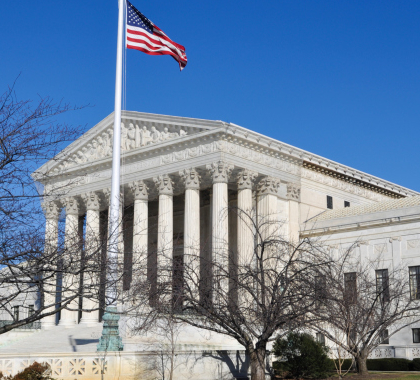The U.S. Supreme Court will consider a case challenging a Montana Supreme Court decision that found the state’s school choice program violated the state constitution.
Montana is one of 37 states that has a “Blaine Amendment” barring “direct or indirect” state aid to religious schools. Montana’s Tax Credit Program, enacted in 2015, allowed taxpayers to take a state income-tax credit for donations to tuition scholarship organizations that paid for children to attend private schools chosen by their parents.
With this case, one single mother may open the door for education choice across the country. Kendra Espinoza is challenging a 2018 Montana Supreme Court ruling that struck down the state’s three-year-old tax credit scholarship program after the Montana Department of Revenue sought to block religious schools from participating.
The U.S. Supreme Court will hear Espinoza v. Montana Department of Revenue during its coming term, which starts on October 7, the court announced June 28.
Exemplary Case
The state bureaucracy betrayed parents like Espinoza by denying their children a chance at a parochial school education, says Jamie Gass, director of the Center for School Reform at the Pioneer Institute.
“Kendra … came under difficult circumstances, as a single mom, with children enrolled in a parochial school,” Gass said. “The Department of Revenue, in conjunction with the Montana Supreme Court, pulled the carpet out from under her.”
Espinoza’s family is the type that school choice programs are designed to help, Gass says.
“Generally speaking, tax credit programs are need-based, so I think the likelihood is that people of different backgrounds in need are going to be eligible for them,” Gass said.
Parents want a chance to decide what type of school is best for their children, says Leslie Hiner, vice president of programs for EdChoice.
“The desire of parents to have true choice for their children’s education is driven by the needs of their children,” Hiner said. “Kendra Espinoza is like most parents. She knows what works for her children, and she knows when her children are not getting what they need.”
Conflicting Rulings
The U.S. Supreme Court ruled vouchers are constitutional in Zelman v. Simmons-Harris in 2002, and it ruled in favor of tax credit scholarship programs in 2011 when their constitutionality came under question in Arizona Christian School Tuition Organization v. Winn.
Yet another Supreme Court ruling gave state courts an opportunity to restrict parents’ ability to choose.
“In another ruling, in 2004, Locke v. Davey, the high court left the door open for states to rely on their own state constitutions to limit funding for students pursuing faith-based education,” Hiner said.
“As a result, with no clear ruling or guidance from the U.S. Supreme Court regarding the constitutionality of state Blaine Amendments, opponents challenge any school choice program they believe gives them the best chance to deny children the option to attend a school other than a public school,” Hiner said.
Based on ‘Religious Bigotry’?
Blaine amendments to state constitutions—and a failed amendment to the U.S. Constitution proposed by Rep. James G. Blaine (R-ME)—were promoted in the late nineteenth century specifically to limit the influence of Catholics and immigrants.
“I think people are becoming more aware of this religious bigotry not just affecting Catholics but people of any faith,” Gass said.
Today, those state provisions are regularly used to challenge school choice programs, Hiner says.
“Blaine Amendments give opponents of educational freedom an opportunity to strike fear in the hearts of legislators and parents by instilling doubt about the constitutionality of school choice and by threatening angry, years-long litigation,” Hiner said.
“Florida school choice programs have been sued multiple times, with the most recent lawsuit finally concluding after 10 long years, in Citizens for Strong Schools v. Florida Board of Education,” Hiner said. “Special interest opponents have vowed to sue again.”
Changing Supreme Court Climate
In 2017, in the case of Trinity Lutheran v. Comer, the U.S. Supreme Court upheld First Amendment protection for the participation of religious institutions in state programs.
“If the Court allows its judgment in Trinity Lutheran to be applied more broadly, to include educational choice, then Kendra Espinoza and the parents of tens of thousands of children across the country may achieve the success they so desperately need to help the children they so deeply cherish,” Hiner said.
Espinoza could lead to a landmark ruling, Gass says.
“I really do think this has the potential to be the Brown v. Board of Education [case] for school choice and religious liberty,” Gass said. “What is different now is the composition of the court. Not just with the majority, even with a few of the members of the minority there might be some support for this on religious freedom issues. I think that people are becoming more and more aware of the legacy of bigotry that has been associated with these Blaine Amendments.
“This case is a cross-section of law and religion and politics and education, and it has huge implications,” Gass said. “Education sits at the center of families and society, so it has big implications. We are very optimistic with the case being taken up by the Court.”
Ashley Bateman ([email protected]) writes from Alexandria, Virginia.
Internet Info:
Joe Barnett, “MT Supreme Court Nixes Education Tax-Credit Scholarship Program,” Budget & Tax News, The Heartland Institute, January 24, 2019: https://heartland.org/news-opinion/news/mt-supreme-court-nixes-education-tax-credit-scholarship-program




